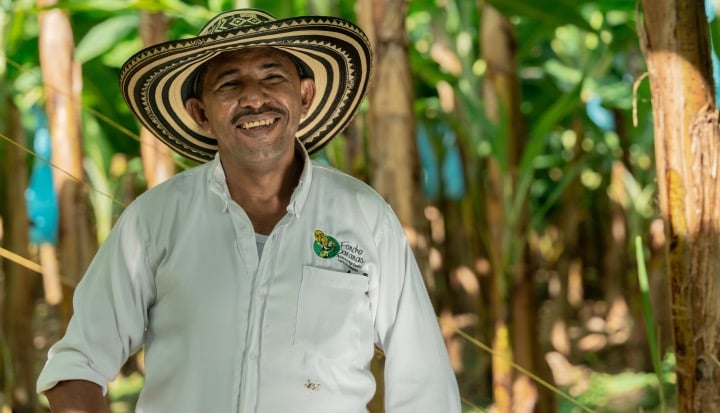“It’s more revolutionary what you put on your plate than what you post on the internet.” Those are the words of Silvia Herrera, a second-generation coffee farmer from Chiapas, southern Mexico, who I met earlier this month.
Silvia is right. We should never underestimate the power we have as consumers. Power to change an unfair trade system which for centuries has put those who farm and grow our much-loved products – such as tea, coffee, cocoa, bananas, flowers and cotton – at one end of a supply chain in which they have little power to negotiate a fairer wage or better working conditions.
This was the case until the concept of Fairtrade was born and for the first time farmers and growers were directly connected – through acts of solidarity and justice from businesses and buyers – to consumers thousands of miles away, and vice versa. Over the last thirty years, millions of people have benefited, and today Fairtrade works with more than 2 million farmers and workers in low-income countries. When you factor in their family members and dependants, an estimated 10 million people are benefiting from Fairtrade.
As the Fairtrade Foundation celebrates its 30th Anniversary, it provides us with a moment to reflect on the incredible impact this movement has had in supporting fair prices for producers and farmers across the world. But as we celebrate these achievements, we must also recognise the need to do more to ensure fairer prices, to put more power in the hands of farmers, and to act urgently in the face of mounting challenges, as we highlight in our new 30th Anniversary Report.
Sadly the world is even more insecure now than it was thirty years ago. Silvia told me how it is increasingly difficult to grow coffee in her region as climate change makes weather more unpredictable. “Every year the rains start later and the average temperature is higher,” she said. “When you talk to elder farmers, they always say that coffee has changed, that 25 years ago it needed way less work than it needs now”.
Coffee has been part of Silvia’s family history for generations. Her father co-founded the Ejidos San Fernando cooperative and having grown up surrounded by coffee trees, Silvia, 33, now holds a position of leadership in the cooperative. As a Q grader (a trained coffee taster) and Q processing professional, she has won awards and is a trailblazer for women in the coffee industry in Mexico.
But she spoke about worried she is about the future of a product and way of life she loves so dearly. As coffee is sensitive to changing rainfall and weather patterns, farmers can lose entire harvests when disaster strikes. Putting it frankly, Silvia said: “If coffee isn’t sustainable for farmers, there won’t be coffee to taste.”
Here in the UK, we must sit up and listen: the UK imports almost half its food, with 16 per cent coming from countries exposed to climate change and lacking the capacity to adapt and respond. Environmental shocks or international conflict brings significant challenges for the farmers Fairtrade works with and can also lead to empty shelves and rocketing food prices in our supermarkets, making the cost of living worse for shoppers in the UK.
To address these challenges, we have issued a series of calls to action to help farmers across the world, including their families and communities, to thrive and to secure the long-term availability of staple foods that consumers in the UK rely upon.
The Foundation is urgently calling on businesses to increase their Fairtrade sourcing commitments, on the next UK government – whichever party or parties make it up following the election – to implement policies on trade and legislation which meet the needs of people and planet, and on supporters and campaigners to hold companies and governments to account, and encourage more people to choose Fairtrade when they shop.

“There are times when it feels like we are not selling, we are being bought”, explained Silvia. “But Fairtrade feels like a partnership, caring about people and environment”.
Our 30th anniversary report, which was launched earlier this month, reveals how ongoing commitments from businesses, and support from consumers, provide a vital lifeline for farmers and workers. This includes enabling farmers to invest Fairtrade Premium funds (an additional sum of money which goes into a communal fund for workers and farmers) in projects addressing challenges such as climate change, and strengthening community welfare, and farming productivity. These investments are crucial for building communities resilient to the impacts of climate change, fluctuating commodity prices and economic instability.
At Silvia’s coffee cooperative in Mexico, part of their Fairtrade Premium funds have been used to build a nursery for coffee plants where they test which varieties (they currently have 17) perform best in terms of quality, and which are more adaptable. “With Fairtrade we have a choice,” Silvia said. “I can produce high quality coffee, not just focus on producing more and more to feed my family.”
As we move into our fourth decade, the Fairtrade Foundation remains committed to supporting ongoing partnerships between farmers, businesses, consumers, and politicians to help build a food and trade system that is fair, sustainable and works for everyone. By working together, we can preserve our planet and the future of our food (as well as our beloved coffee).










